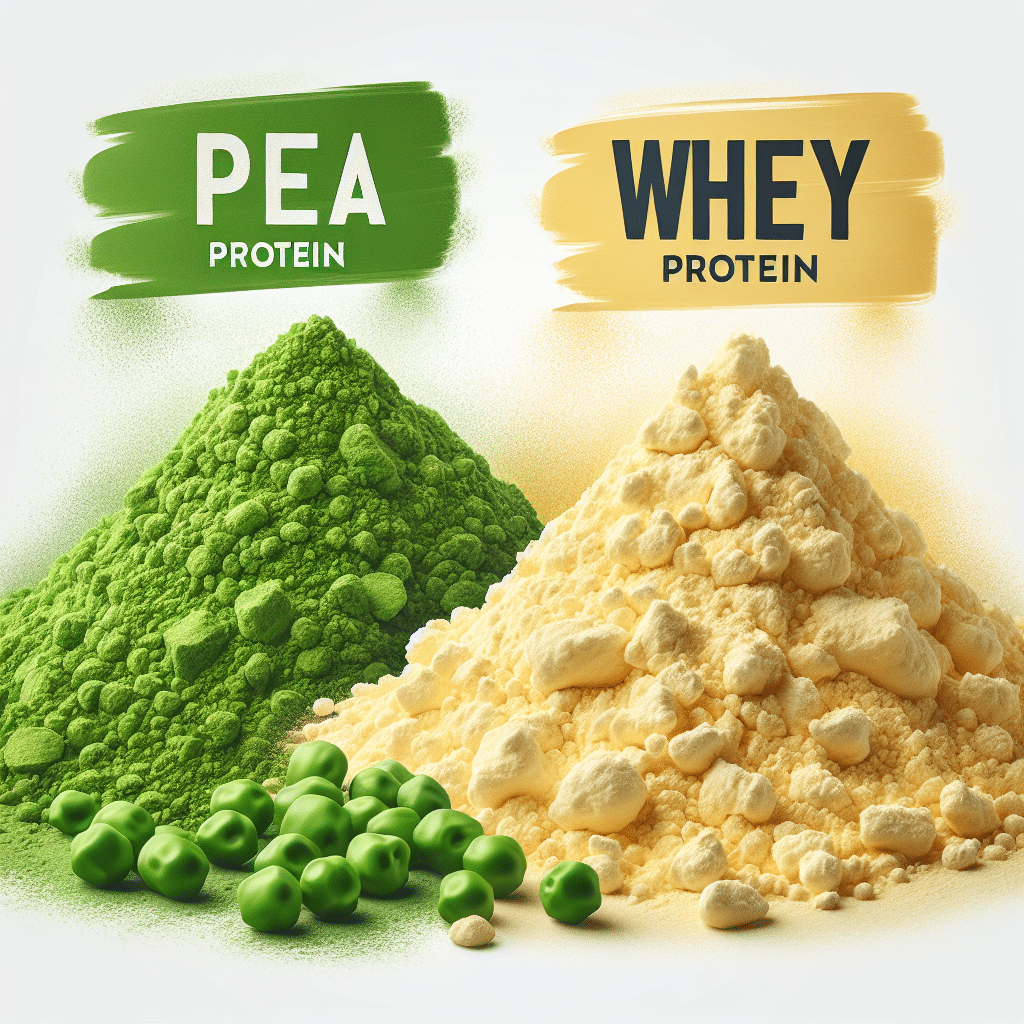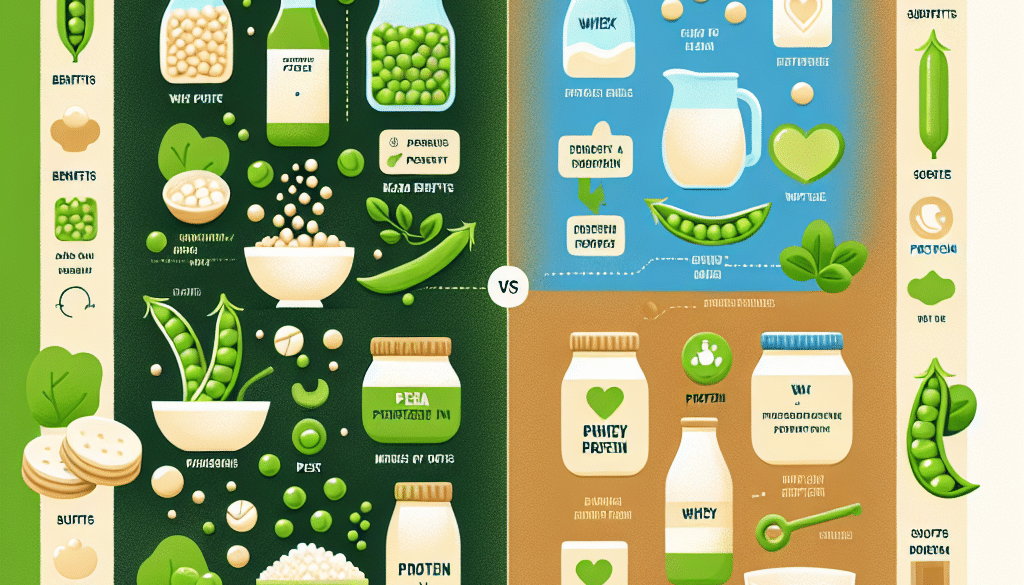Which is better pea or whey protein?
-
Table of Contents
- Pea Protein vs. Whey Protein: Which Reigns Supreme?
- Nutritional Profile Comparison
- Pea Protein
- Whey Protein
- Digestibility and Absorption
- Pea Protein
- Whey Protein
- Muscle Growth and Recovery
- Pea Protein
- Whey Protein
- Allergies and Intolerances
- Pea Protein
- Whey Protein
- Environmental Impact
- Pea Protein
- Whey Protein
- Taste and Versatility
- Pea Protein
- Whey Protein
- Cost Considerations
- Pea Protein
- Whey Protein
- Conclusion: Weighing Your Options
- Discover ETprotein’s Premium Protein Products
Pea Protein vs. Whey Protein: Which Reigns Supreme?

When it comes to protein supplements, the debate between pea protein and whey protein is a hot topic among fitness enthusiasts, athletes, and those looking to improve their dietary intake. Both have their unique advantages and potential drawbacks, and choosing the right one can depend on a variety of factors including dietary restrictions, health goals, and personal preferences. In this article, we’ll delve into the specifics of pea and whey protein, comparing their nutritional profiles, digestibility, environmental impact, and more to help you make an informed decision.
Nutritional Profile Comparison
Understanding the nutritional content of pea and whey protein is crucial in determining which is better suited for your needs.
Pea Protein
- Rich in iron
- Contains all nine essential amino acids
- Typically lower in methionine
- Free from dairy, making it suitable for vegans and those with lactose intolerance
Whey Protein
- High biological value, meaning it’s efficiently absorbed and utilized by the body
- Rich in branched-chain amino acids (BCAAs), especially leucine, which is beneficial for muscle building
- Contains lactose, which can be problematic for those with lactose intolerance
- Often contains more essential amino acids per serving compared to pea protein
Digestibility and Absorption
Protein quality is not just about the amino acid profile but also how well it’s digested and absorbed.
Pea Protein
Pea protein is generally well-digested, especially when processed to remove anti-nutrients that can interfere with protein absorption. However, it may not be absorbed as rapidly as whey protein.
Whey Protein
Whey protein is known for its rapid absorption rate, making it a favorite among athletes for post-workout recovery. Its high digestibility is attributed to the presence of peptides that aid in the absorption process.
Muscle Growth and Recovery
For those looking to build muscle or enhance recovery after exercise, the choice of protein can be significant.
Pea Protein
Studies have shown that pea protein can promote muscle growth effectively, especially when consumed in adequate amounts to meet protein needs.
Whey Protein
Whey protein has been extensively studied for its role in muscle synthesis and recovery, with evidence supporting its effectiveness due to the high content of BCAAs.
Allergies and Intolerances
Food allergies and intolerances play a major role in choosing a protein supplement.
Pea Protein
As a plant-based option, pea protein is hypoallergenic and free from common allergens like dairy, making it a safe choice for many individuals with dietary restrictions.
Whey Protein
Whey protein is derived from milk and can cause issues for those with lactose intolerance or a milk allergy. However, whey isolate options with reduced lactose content are available.
Environmental Impact
The sustainability of protein sources is increasingly important in today’s environmentally-conscious society.
Pea Protein
Pea protein is often touted for its lower environmental footprint, requiring less water and land to produce compared to animal-based proteins.
Whey Protein
Whey protein production is tied to the dairy industry, which has a higher environmental impact in terms of greenhouse gas emissions, water usage, and land requirements.
Taste and Versatility
The taste and how well the protein can be incorporated into different foods and beverages can influence consumer preference.
Pea Protein
Pea protein has a distinct taste that some may find less palatable, but it can be masked in flavored products or blended into smoothies and baked goods.
Whey Protein
Whey protein is often preferred for its smoother texture and ability to blend well with various flavors, making it a versatile ingredient in shakes, bars, and other products.
Cost Considerations
Price can be a deciding factor for many consumers when selecting a protein supplement.
Pea Protein
Pea protein is generally affordable and offers a cost-effective plant-based protein option.
Whey Protein
Whey protein varies in price, with concentrates being more budget-friendly and isolates being on the higher end due to additional processing.
Conclusion: Weighing Your Options
In conclusion, both pea and whey protein have their merits. Whey protein stands out for its superior amino acid profile and fast absorption, making it ideal for muscle building and recovery. Pea protein, on the other hand, offers a plant-based alternative that is environmentally friendly and suitable for those with allergies or intolerances. Ultimately, the choice between pea and whey protein should be based on individual dietary needs, health goals, and personal values.
Discover ETprotein’s Premium Protein Products
If you’re looking for high-quality protein supplements, consider ETprotein’s range of products. They offer both pea and whey protein options to cater to various preferences and dietary requirements. With a commitment to purity and quality, ETprotein ensures that you receive the best protein to support your health and fitness journey.
About ETprotein:
ETprotein, a reputable protein and L-(+)-Ergothioneine (EGT) Chinese factory manufacturer and supplier, is renowned for producing, stocking, exporting, and delivering the highest quality organic bulk vegan proteins and L-(+)-Ergothioneine. They include Organic rice protein, clear rice protein, pea protein, clear pea protein, watermelon seed protein, pumpkin seed protein, sunflower seed protein, mung bean protein, peanut protein, and L-(+)-Ergothioneine EGT Pharmaceutical grade, L-(+)-Ergothioneine EGT food grade, L-(+)-Ergothioneine EGT cosmetic grade, L-(+)-Ergothioneine EGT reference grade and L-(+)-Ergothioneine EGT standard. Their offerings, characterized by a neutral taste, non-GMO, allergen-free attributes, with L-(+)-Ergothioneine purity over 98%, 99%, cater to a diverse range of industries. They serve nutraceutical, pharmaceutical, cosmeceutical, veterinary, as well as food and beverage finished product distributors, traders, and manufacturers across Europe, USA, Canada, Australia, Thailand, Japan, Korea, Brazil, and Chile, among others.
ETprotein specialization includes exporting and delivering tailor-made protein powder and finished nutritional supplements. Their extensive product range covers sectors like Food and Beverage, Sports Nutrition, Weight Management, Dietary Supplements, Health and Wellness Products, and Infant Formula, ensuring comprehensive solutions to meet all your protein needs.
As a trusted company by leading global food and beverage brands and Fortune 500 companies, ETprotein reinforces China’s reputation in the global arena. For more information or to sample their products, please contact them and email sales(at)ETprotein.com today.












